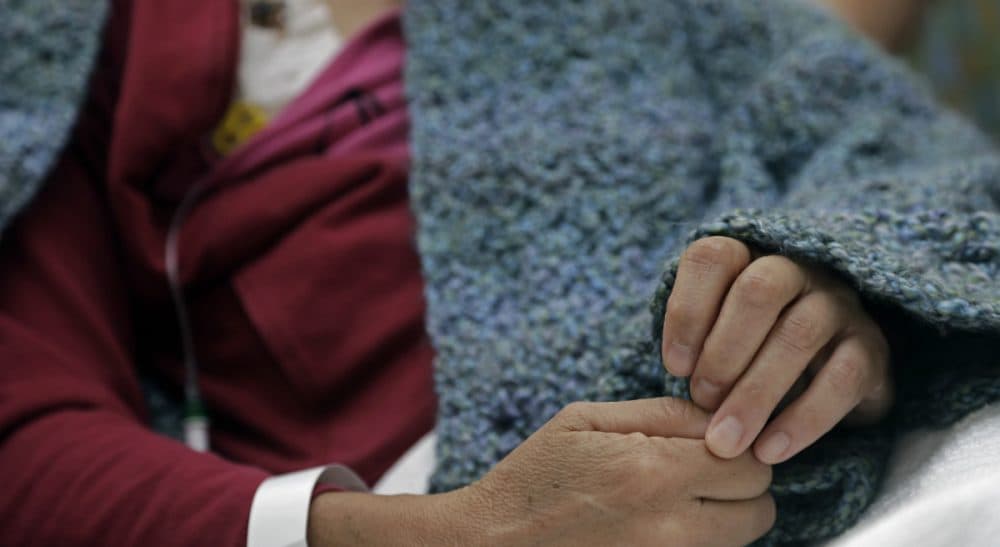Advertisement
Harming Patient Satisfaction In The Process Of Measuring It

The first time the social worker asked if she could check in with me was this past summer during chemo. We chatted some, and after a while she got up to leave. Then she parted the privacy curtain, stepped out, poked her head back in and said, “Oh, I forgot to ask. What are you most afraid of?”
Patients are often criticized for what are called “door handle comments” — those comments brought up as the health care provider is walking out of the room and already has one hand on the door. They are often doozies — a patient who has had a very straight-forward appointment might state that they have been having chest pain. Or a myriad of other disclosures that, had they been revealed earlier on, would have directed the appointment very differently.
Health care professionals do it, too.
And then [the social worker] tells me that she appreciates the constructive criticism I gave her in my patient satisfaction survey. What?! She knows what I wrote and she is acknowledging that to me?
“What are you most afraid of?” is a huge, sweeping question. It invites all sorts of scary answers — some of which I gave to the social worker while she was only half in my closed curtain space. I am most worried about dying, frankly. And what that would mean for my children. I felt guilty saying that to the social worker as she was leaving. I felt I had burdened her. I had to remind myself that she had asked, that she was the oncology social worker and that she probably (hopefully?) had training in how to respond.
I am not sure she did. She walked back into my space, sat down and stated that these were normal feelings. I started to cry. She asked if I was OK. I said I would be. And she left.
A few weeks later I received a patient satisfaction survey. In the multiple choice section, I reported that everything was going pretty well at chemo. In the written comments, I described the social worker's surprising last-minute question and her clumsy attempt to excuse herself as quickly as possible.
Then, just this week at chemo, I run into her. Which is to say that I almost actually run into her because I am having an ocular migraine and am squinting so as to limit the kaleidoscope patterns dancing in front of my eyes. She asks if I have time to talk. I say yes and go sit down and snuggle under the pre-warmed blanket. The kaleidoscope patterns are diminishing and I can almost see again. The social worker comes over, pulls the curtain and sits down. We talk about my children, work and me. And then she tells me that she appreciates the constructive criticism I gave her in my patient satisfaction survey.
Advertisement
What?! She knows what I wrote and she is acknowledging that to me?
She tells me that she and her supervisor worked on her skills over the past few months and she feels good about her progress.
Really? Because as I sit there in the chemo-pod, under a blanket, IV tubes hanging from my chest, and about to get my chemo-infusion, I feel incredibly vulnerable. I am all but in a bed and we are in an enclosed space, and although I can hear her words telling me that she is grateful to have had the opportunity to work on her skills, I cannot believe she is saying those words. It is like the kaleidoscope patterns I had been seeing earlier — they sound like words I know but they do not make sense. I can’t believe that in this space she is telling me about her vulnerability.
As a pediatrician in a hospital-based practice, I know my patients are asked to fill out patient satisfaction surveys. Yet I have only ever received feedback in the form of aggregate numbers describing how our department is doing. It turns out that the forms are not anonymous. In the hospital where I both work and get my chemotherapy, the surveys — that are increasingly federally mandated for every inpatient and outpatient encounter — have numbers on them that link them back to the person filling them out. The comments from the survey — especially extremely positive or negative ones — are transcribed and sent to the relevant supervisor. The supervisor can then link the feedback with actual patients and actual experiences and share that information with everyone being evaluated.
Given the growing importance of these surveys in improving health care, they could and should be a lot more patient-centered.
This month, the federal agency that administers federal health care programs, the Centers for Medicare and Medicaid Services (CMS), adds inpatient and outpatient surgery centers to the growing list of health care sites that should send out patient satisfaction surveys. Like the surveys already in use in hospitals and offices, this initiative starts out as a voluntary reporting program. But in time, the surveys will be mandatory and CMS will publicly report aggregate data. CMS is starting to use the surveys for what they call "value-based purchasing," where they calculate reimbursement rates for health care sites based on the quality of work that they do.
Given the growing importance of these surveys in improving health care, they could and should be a lot more patient-centered. For one, patients should be aware that the surveys are not anonymous. Secondly, patients should be able to opt-in or out of these kinds of discussions. Patients who opt in could elect to have those conversations at their next appointment. Or, at any another mutually agreed upon time when they are fully clothed, sitting upright, and understand the purpose of the encounter.
I am disheartened by this experience, and I need to tell someone about it. I am considering bringing it up at next week’s chemo appointment — well before my oncologist has his hand on the door and is about to walk out. Or, I could wait until I get the next survey in the mail.
